SWK2114: Understanding Social Determinants of Health & Well-being
VerifiedAdded on 2023/06/08
|8
|2276
|131
Essay
AI Summary
This essay provides a comprehensive overview of social determinants of health, as defined by the World Health Organization, and their impact on individuals and communities. It highlights the role of socioeconomic factors, unemployment, and other social conditions in shaping health outcomes. The essay also contrasts the traditional medical model of care with the social model, emphasizing the importance of addressing broader social, cultural, and economic influences on health. It discusses the benefits of considering social determinants, such as reducing social inequities and empowering communities, while also acknowledging the limitations, including the time-consuming nature of interventions and the difficulty in measuring their effectiveness. The role of social workers in advocating for policy changes and implementing interventions to improve social conditions and promote better health outcomes is also explored.
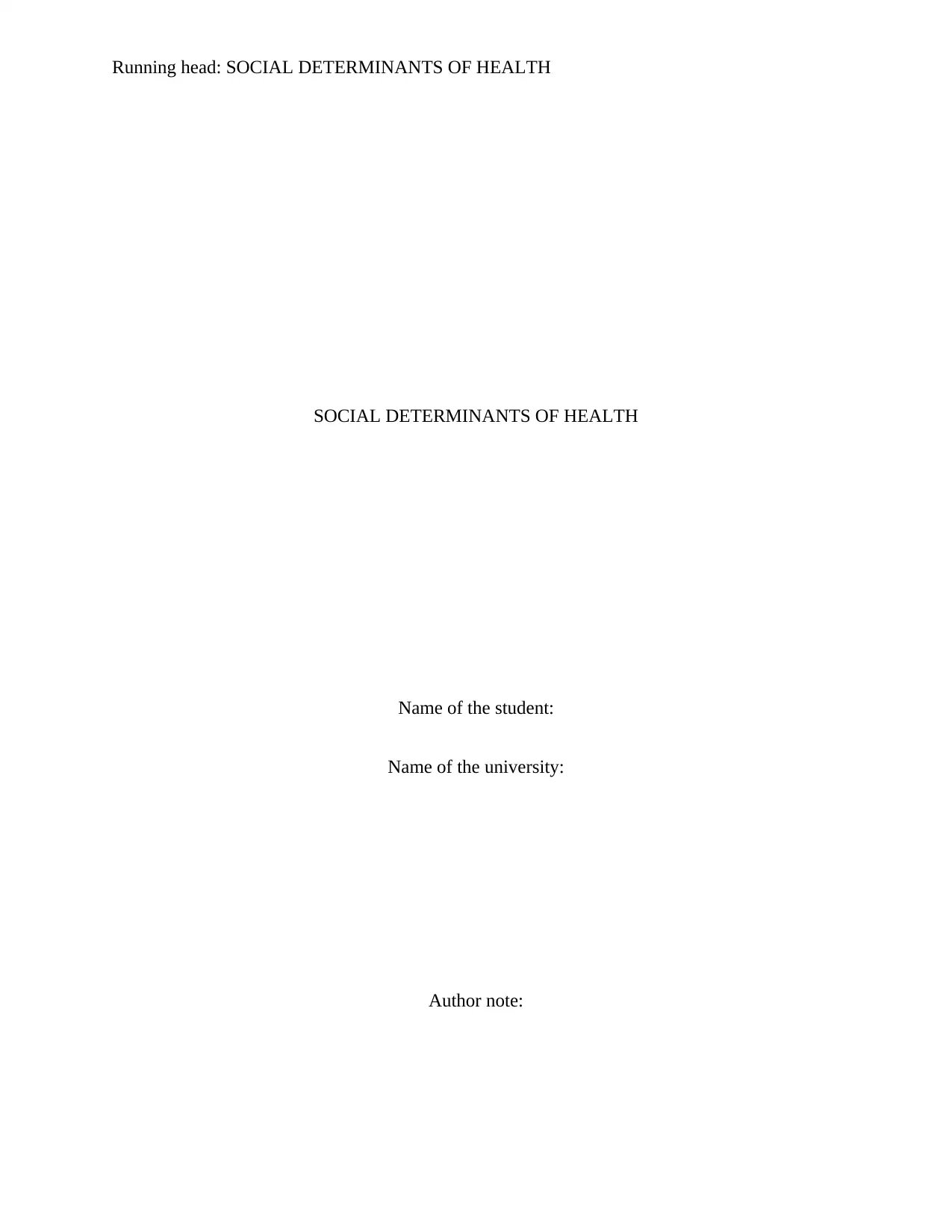
Running head: SOCIAL DETERMINANTS OF HEALTH
SOCIAL DETERMINANTS OF HEALTH
Name of the student:
Name of the university:
Author note:
SOCIAL DETERMINANTS OF HEALTH
Name of the student:
Name of the university:
Author note:
Paraphrase This Document
Need a fresh take? Get an instant paraphrase of this document with our AI Paraphraser
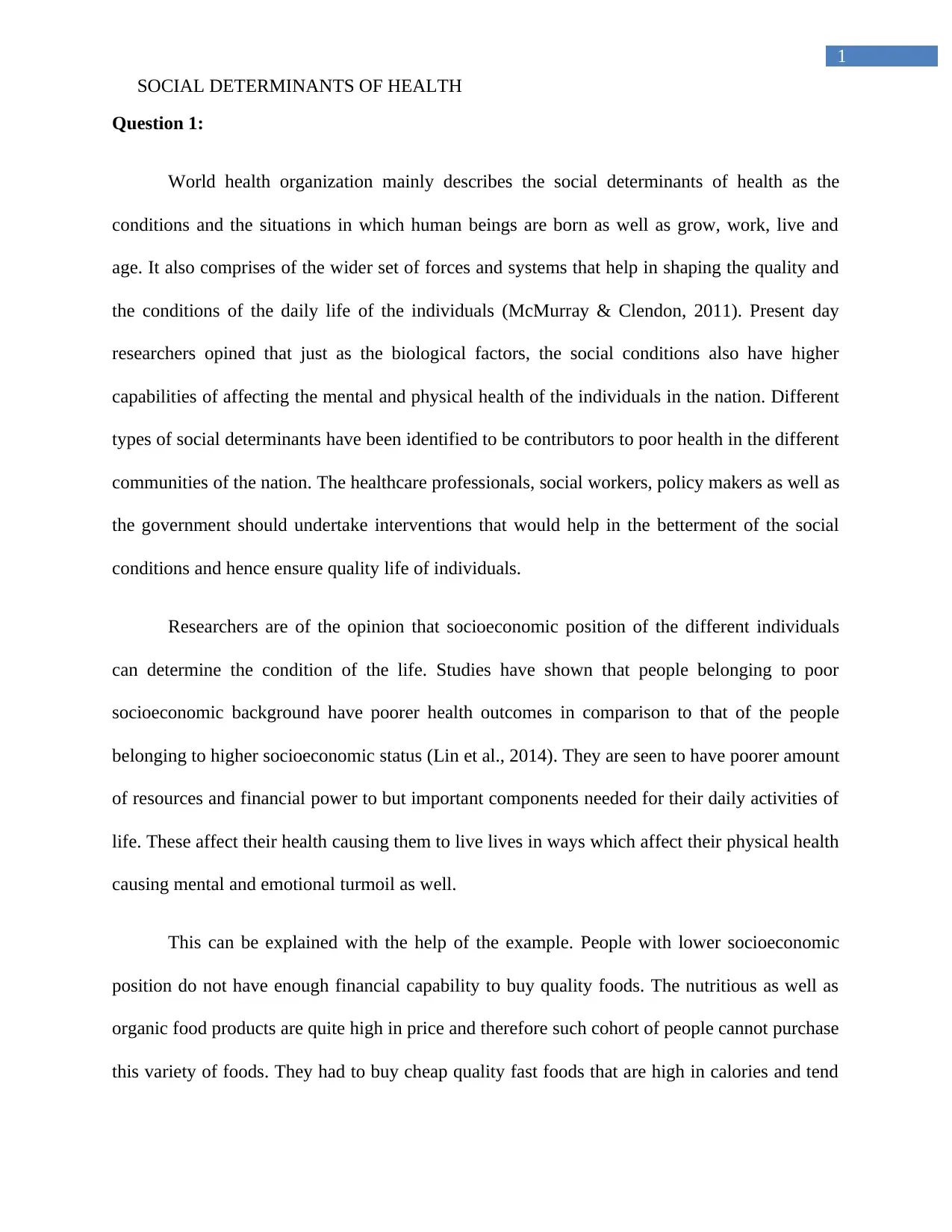
1
SOCIAL DETERMINANTS OF HEALTH
Question 1:
World health organization mainly describes the social determinants of health as the
conditions and the situations in which human beings are born as well as grow, work, live and
age. It also comprises of the wider set of forces and systems that help in shaping the quality and
the conditions of the daily life of the individuals (McMurray & Clendon, 2011). Present day
researchers opined that just as the biological factors, the social conditions also have higher
capabilities of affecting the mental and physical health of the individuals in the nation. Different
types of social determinants have been identified to be contributors to poor health in the different
communities of the nation. The healthcare professionals, social workers, policy makers as well as
the government should undertake interventions that would help in the betterment of the social
conditions and hence ensure quality life of individuals.
Researchers are of the opinion that socioeconomic position of the different individuals
can determine the condition of the life. Studies have shown that people belonging to poor
socioeconomic background have poorer health outcomes in comparison to that of the people
belonging to higher socioeconomic status (Lin et al., 2014). They are seen to have poorer amount
of resources and financial power to but important components needed for their daily activities of
life. These affect their health causing them to live lives in ways which affect their physical health
causing mental and emotional turmoil as well.
This can be explained with the help of the example. People with lower socioeconomic
position do not have enough financial capability to buy quality foods. The nutritious as well as
organic food products are quite high in price and therefore such cohort of people cannot purchase
this variety of foods. They had to buy cheap quality fast foods that are high in calories and tend
SOCIAL DETERMINANTS OF HEALTH
Question 1:
World health organization mainly describes the social determinants of health as the
conditions and the situations in which human beings are born as well as grow, work, live and
age. It also comprises of the wider set of forces and systems that help in shaping the quality and
the conditions of the daily life of the individuals (McMurray & Clendon, 2011). Present day
researchers opined that just as the biological factors, the social conditions also have higher
capabilities of affecting the mental and physical health of the individuals in the nation. Different
types of social determinants have been identified to be contributors to poor health in the different
communities of the nation. The healthcare professionals, social workers, policy makers as well as
the government should undertake interventions that would help in the betterment of the social
conditions and hence ensure quality life of individuals.
Researchers are of the opinion that socioeconomic position of the different individuals
can determine the condition of the life. Studies have shown that people belonging to poor
socioeconomic background have poorer health outcomes in comparison to that of the people
belonging to higher socioeconomic status (Lin et al., 2014). They are seen to have poorer amount
of resources and financial power to but important components needed for their daily activities of
life. These affect their health causing them to live lives in ways which affect their physical health
causing mental and emotional turmoil as well.
This can be explained with the help of the example. People with lower socioeconomic
position do not have enough financial capability to buy quality foods. The nutritious as well as
organic food products are quite high in price and therefore such cohort of people cannot purchase
this variety of foods. They had to buy cheap quality fast foods that are high in calories and tend
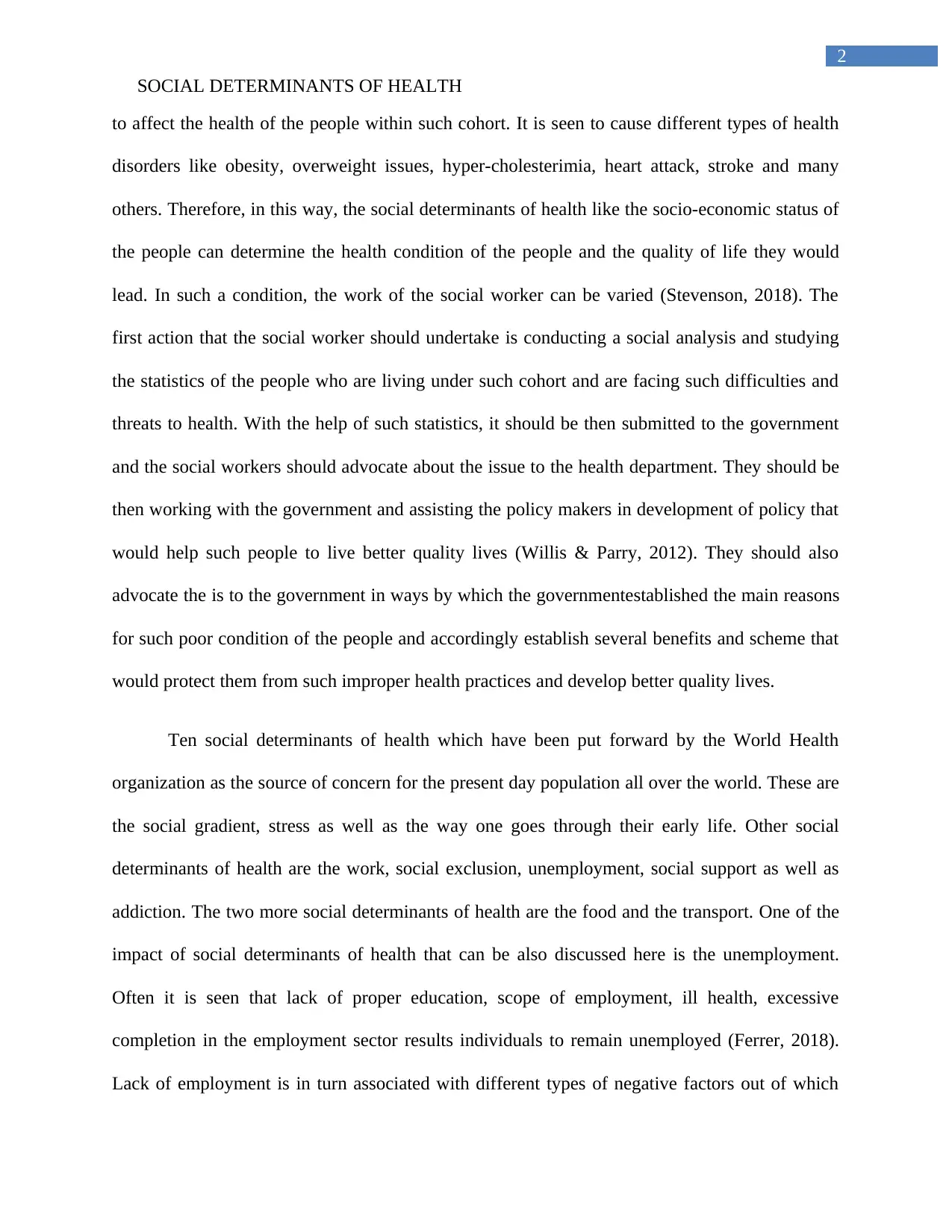
2
SOCIAL DETERMINANTS OF HEALTH
to affect the health of the people within such cohort. It is seen to cause different types of health
disorders like obesity, overweight issues, hyper-cholesterimia, heart attack, stroke and many
others. Therefore, in this way, the social determinants of health like the socio-economic status of
the people can determine the health condition of the people and the quality of life they would
lead. In such a condition, the work of the social worker can be varied (Stevenson, 2018). The
first action that the social worker should undertake is conducting a social analysis and studying
the statistics of the people who are living under such cohort and are facing such difficulties and
threats to health. With the help of such statistics, it should be then submitted to the government
and the social workers should advocate about the issue to the health department. They should be
then working with the government and assisting the policy makers in development of policy that
would help such people to live better quality lives (Willis & Parry, 2012). They should also
advocate the is to the government in ways by which the governmentestablished the main reasons
for such poor condition of the people and accordingly establish several benefits and scheme that
would protect them from such improper health practices and develop better quality lives.
Ten social determinants of health which have been put forward by the World Health
organization as the source of concern for the present day population all over the world. These are
the social gradient, stress as well as the way one goes through their early life. Other social
determinants of health are the work, social exclusion, unemployment, social support as well as
addiction. The two more social determinants of health are the food and the transport. One of the
impact of social determinants of health that can be also discussed here is the unemployment.
Often it is seen that lack of proper education, scope of employment, ill health, excessive
completion in the employment sector results individuals to remain unemployed (Ferrer, 2018).
Lack of employment is in turn associated with different types of negative factors out of which
SOCIAL DETERMINANTS OF HEALTH
to affect the health of the people within such cohort. It is seen to cause different types of health
disorders like obesity, overweight issues, hyper-cholesterimia, heart attack, stroke and many
others. Therefore, in this way, the social determinants of health like the socio-economic status of
the people can determine the health condition of the people and the quality of life they would
lead. In such a condition, the work of the social worker can be varied (Stevenson, 2018). The
first action that the social worker should undertake is conducting a social analysis and studying
the statistics of the people who are living under such cohort and are facing such difficulties and
threats to health. With the help of such statistics, it should be then submitted to the government
and the social workers should advocate about the issue to the health department. They should be
then working with the government and assisting the policy makers in development of policy that
would help such people to live better quality lives (Willis & Parry, 2012). They should also
advocate the is to the government in ways by which the governmentestablished the main reasons
for such poor condition of the people and accordingly establish several benefits and scheme that
would protect them from such improper health practices and develop better quality lives.
Ten social determinants of health which have been put forward by the World Health
organization as the source of concern for the present day population all over the world. These are
the social gradient, stress as well as the way one goes through their early life. Other social
determinants of health are the work, social exclusion, unemployment, social support as well as
addiction. The two more social determinants of health are the food and the transport. One of the
impact of social determinants of health that can be also discussed here is the unemployment.
Often it is seen that lack of proper education, scope of employment, ill health, excessive
completion in the employment sector results individuals to remain unemployed (Ferrer, 2018).
Lack of employment is in turn associated with different types of negative factors out of which
⊘ This is a preview!⊘
Do you want full access?
Subscribe today to unlock all pages.

Trusted by 1+ million students worldwide
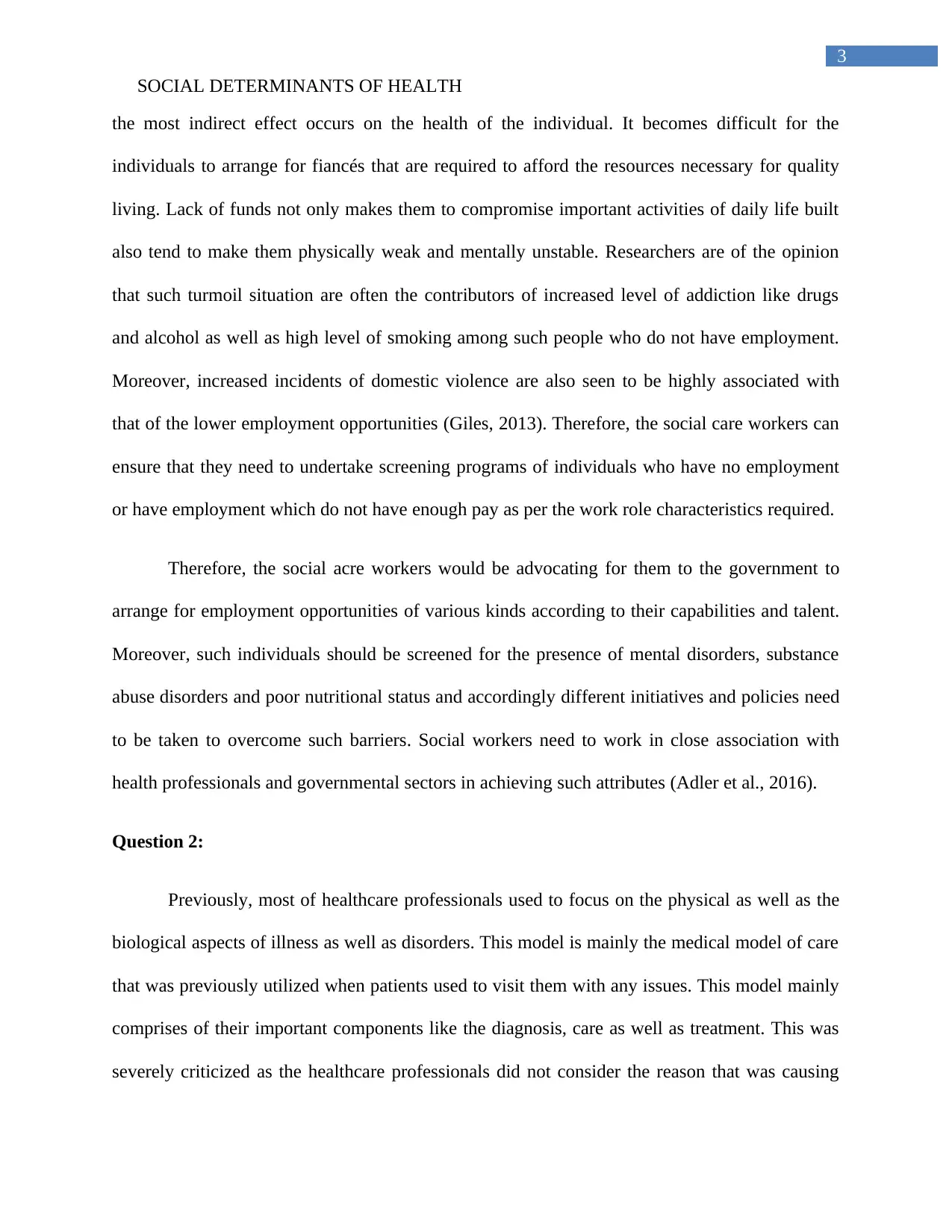
3
SOCIAL DETERMINANTS OF HEALTH
the most indirect effect occurs on the health of the individual. It becomes difficult for the
individuals to arrange for fiancés that are required to afford the resources necessary for quality
living. Lack of funds not only makes them to compromise important activities of daily life built
also tend to make them physically weak and mentally unstable. Researchers are of the opinion
that such turmoil situation are often the contributors of increased level of addiction like drugs
and alcohol as well as high level of smoking among such people who do not have employment.
Moreover, increased incidents of domestic violence are also seen to be highly associated with
that of the lower employment opportunities (Giles, 2013). Therefore, the social care workers can
ensure that they need to undertake screening programs of individuals who have no employment
or have employment which do not have enough pay as per the work role characteristics required.
Therefore, the social acre workers would be advocating for them to the government to
arrange for employment opportunities of various kinds according to their capabilities and talent.
Moreover, such individuals should be screened for the presence of mental disorders, substance
abuse disorders and poor nutritional status and accordingly different initiatives and policies need
to be taken to overcome such barriers. Social workers need to work in close association with
health professionals and governmental sectors in achieving such attributes (Adler et al., 2016).
Question 2:
Previously, most of healthcare professionals used to focus on the physical as well as the
biological aspects of illness as well as disorders. This model is mainly the medical model of care
that was previously utilized when patients used to visit them with any issues. This model mainly
comprises of their important components like the diagnosis, care as well as treatment. This was
severely criticized as the healthcare professionals did not consider the reason that was causing
SOCIAL DETERMINANTS OF HEALTH
the most indirect effect occurs on the health of the individual. It becomes difficult for the
individuals to arrange for fiancés that are required to afford the resources necessary for quality
living. Lack of funds not only makes them to compromise important activities of daily life built
also tend to make them physically weak and mentally unstable. Researchers are of the opinion
that such turmoil situation are often the contributors of increased level of addiction like drugs
and alcohol as well as high level of smoking among such people who do not have employment.
Moreover, increased incidents of domestic violence are also seen to be highly associated with
that of the lower employment opportunities (Giles, 2013). Therefore, the social care workers can
ensure that they need to undertake screening programs of individuals who have no employment
or have employment which do not have enough pay as per the work role characteristics required.
Therefore, the social acre workers would be advocating for them to the government to
arrange for employment opportunities of various kinds according to their capabilities and talent.
Moreover, such individuals should be screened for the presence of mental disorders, substance
abuse disorders and poor nutritional status and accordingly different initiatives and policies need
to be taken to overcome such barriers. Social workers need to work in close association with
health professionals and governmental sectors in achieving such attributes (Adler et al., 2016).
Question 2:
Previously, most of healthcare professionals used to focus on the physical as well as the
biological aspects of illness as well as disorders. This model is mainly the medical model of care
that was previously utilized when patients used to visit them with any issues. This model mainly
comprises of their important components like the diagnosis, care as well as treatment. This was
severely criticized as the healthcare professionals did not consider the reason that was causing
Paraphrase This Document
Need a fresh take? Get an instant paraphrase of this document with our AI Paraphraser
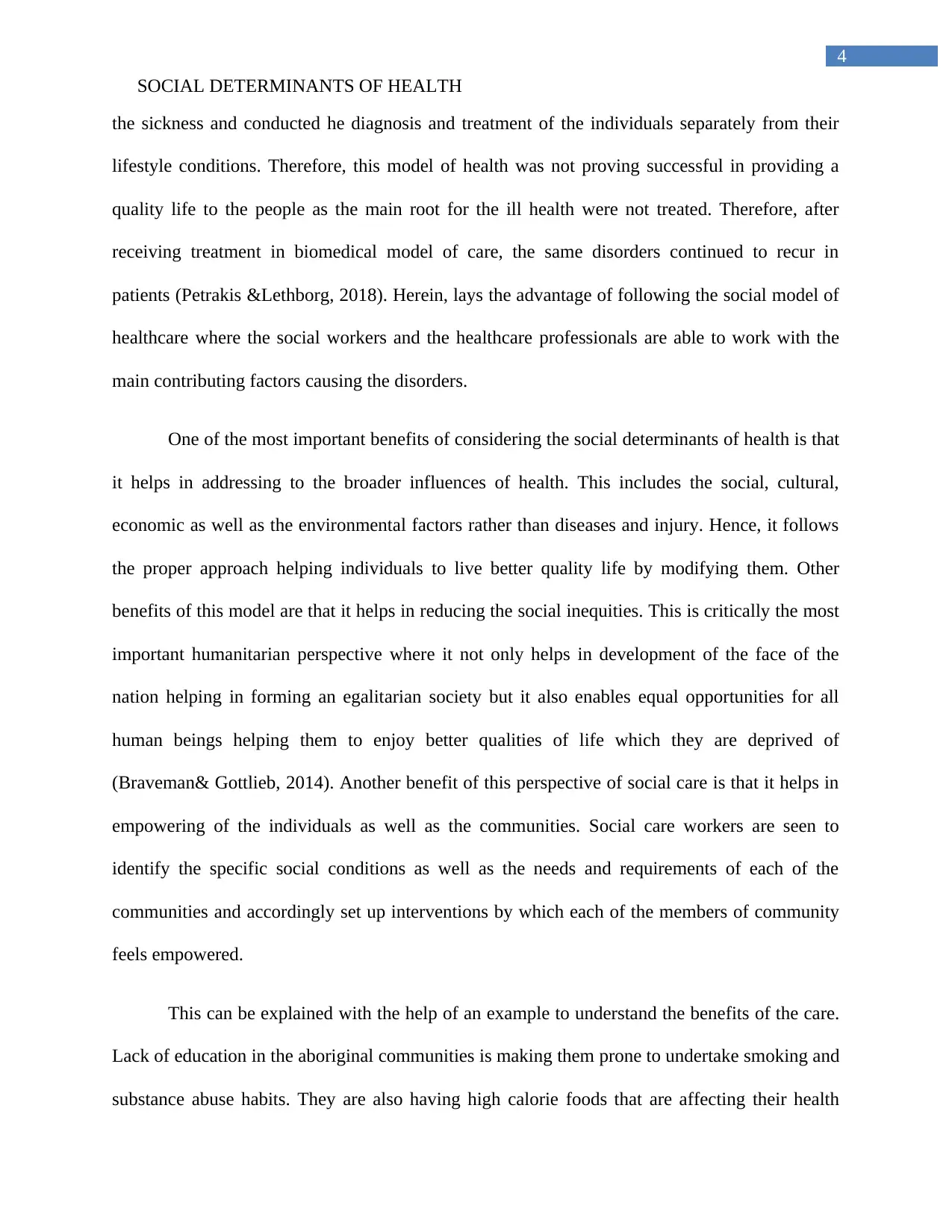
4
SOCIAL DETERMINANTS OF HEALTH
the sickness and conducted he diagnosis and treatment of the individuals separately from their
lifestyle conditions. Therefore, this model of health was not proving successful in providing a
quality life to the people as the main root for the ill health were not treated. Therefore, after
receiving treatment in biomedical model of care, the same disorders continued to recur in
patients (Petrakis &Lethborg, 2018). Herein, lays the advantage of following the social model of
healthcare where the social workers and the healthcare professionals are able to work with the
main contributing factors causing the disorders.
One of the most important benefits of considering the social determinants of health is that
it helps in addressing to the broader influences of health. This includes the social, cultural,
economic as well as the environmental factors rather than diseases and injury. Hence, it follows
the proper approach helping individuals to live better quality life by modifying them. Other
benefits of this model are that it helps in reducing the social inequities. This is critically the most
important humanitarian perspective where it not only helps in development of the face of the
nation helping in forming an egalitarian society but it also enables equal opportunities for all
human beings helping them to enjoy better qualities of life which they are deprived of
(Braveman& Gottlieb, 2014). Another benefit of this perspective of social care is that it helps in
empowering of the individuals as well as the communities. Social care workers are seen to
identify the specific social conditions as well as the needs and requirements of each of the
communities and accordingly set up interventions by which each of the members of community
feels empowered.
This can be explained with the help of an example to understand the benefits of the care.
Lack of education in the aboriginal communities is making them prone to undertake smoking and
substance abuse habits. They are also having high calorie foods that are affecting their health
SOCIAL DETERMINANTS OF HEALTH
the sickness and conducted he diagnosis and treatment of the individuals separately from their
lifestyle conditions. Therefore, this model of health was not proving successful in providing a
quality life to the people as the main root for the ill health were not treated. Therefore, after
receiving treatment in biomedical model of care, the same disorders continued to recur in
patients (Petrakis &Lethborg, 2018). Herein, lays the advantage of following the social model of
healthcare where the social workers and the healthcare professionals are able to work with the
main contributing factors causing the disorders.
One of the most important benefits of considering the social determinants of health is that
it helps in addressing to the broader influences of health. This includes the social, cultural,
economic as well as the environmental factors rather than diseases and injury. Hence, it follows
the proper approach helping individuals to live better quality life by modifying them. Other
benefits of this model are that it helps in reducing the social inequities. This is critically the most
important humanitarian perspective where it not only helps in development of the face of the
nation helping in forming an egalitarian society but it also enables equal opportunities for all
human beings helping them to enjoy better qualities of life which they are deprived of
(Braveman& Gottlieb, 2014). Another benefit of this perspective of social care is that it helps in
empowering of the individuals as well as the communities. Social care workers are seen to
identify the specific social conditions as well as the needs and requirements of each of the
communities and accordingly set up interventions by which each of the members of community
feels empowered.
This can be explained with the help of an example to understand the benefits of the care.
Lack of education in the aboriginal communities is making them prone to undertake smoking and
substance abuse habits. They are also having high calorie foods that are affecting their health
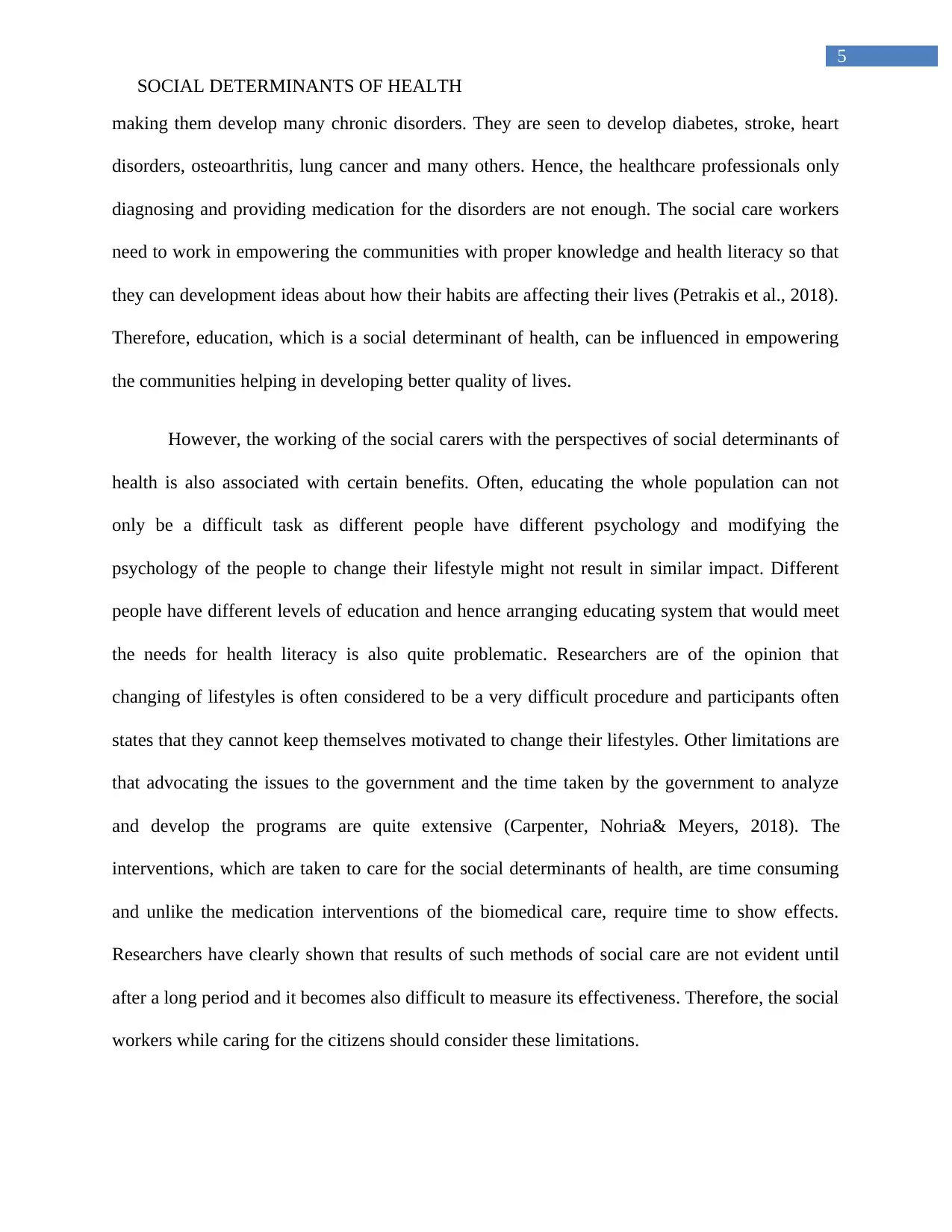
5
SOCIAL DETERMINANTS OF HEALTH
making them develop many chronic disorders. They are seen to develop diabetes, stroke, heart
disorders, osteoarthritis, lung cancer and many others. Hence, the healthcare professionals only
diagnosing and providing medication for the disorders are not enough. The social care workers
need to work in empowering the communities with proper knowledge and health literacy so that
they can development ideas about how their habits are affecting their lives (Petrakis et al., 2018).
Therefore, education, which is a social determinant of health, can be influenced in empowering
the communities helping in developing better quality of lives.
However, the working of the social carers with the perspectives of social determinants of
health is also associated with certain benefits. Often, educating the whole population can not
only be a difficult task as different people have different psychology and modifying the
psychology of the people to change their lifestyle might not result in similar impact. Different
people have different levels of education and hence arranging educating system that would meet
the needs for health literacy is also quite problematic. Researchers are of the opinion that
changing of lifestyles is often considered to be a very difficult procedure and participants often
states that they cannot keep themselves motivated to change their lifestyles. Other limitations are
that advocating the issues to the government and the time taken by the government to analyze
and develop the programs are quite extensive (Carpenter, Nohria& Meyers, 2018). The
interventions, which are taken to care for the social determinants of health, are time consuming
and unlike the medication interventions of the biomedical care, require time to show effects.
Researchers have clearly shown that results of such methods of social care are not evident until
after a long period and it becomes also difficult to measure its effectiveness. Therefore, the social
workers while caring for the citizens should consider these limitations.
SOCIAL DETERMINANTS OF HEALTH
making them develop many chronic disorders. They are seen to develop diabetes, stroke, heart
disorders, osteoarthritis, lung cancer and many others. Hence, the healthcare professionals only
diagnosing and providing medication for the disorders are not enough. The social care workers
need to work in empowering the communities with proper knowledge and health literacy so that
they can development ideas about how their habits are affecting their lives (Petrakis et al., 2018).
Therefore, education, which is a social determinant of health, can be influenced in empowering
the communities helping in developing better quality of lives.
However, the working of the social carers with the perspectives of social determinants of
health is also associated with certain benefits. Often, educating the whole population can not
only be a difficult task as different people have different psychology and modifying the
psychology of the people to change their lifestyle might not result in similar impact. Different
people have different levels of education and hence arranging educating system that would meet
the needs for health literacy is also quite problematic. Researchers are of the opinion that
changing of lifestyles is often considered to be a very difficult procedure and participants often
states that they cannot keep themselves motivated to change their lifestyles. Other limitations are
that advocating the issues to the government and the time taken by the government to analyze
and develop the programs are quite extensive (Carpenter, Nohria& Meyers, 2018). The
interventions, which are taken to care for the social determinants of health, are time consuming
and unlike the medication interventions of the biomedical care, require time to show effects.
Researchers have clearly shown that results of such methods of social care are not evident until
after a long period and it becomes also difficult to measure its effectiveness. Therefore, the social
workers while caring for the citizens should consider these limitations.
⊘ This is a preview!⊘
Do you want full access?
Subscribe today to unlock all pages.

Trusted by 1+ million students worldwide
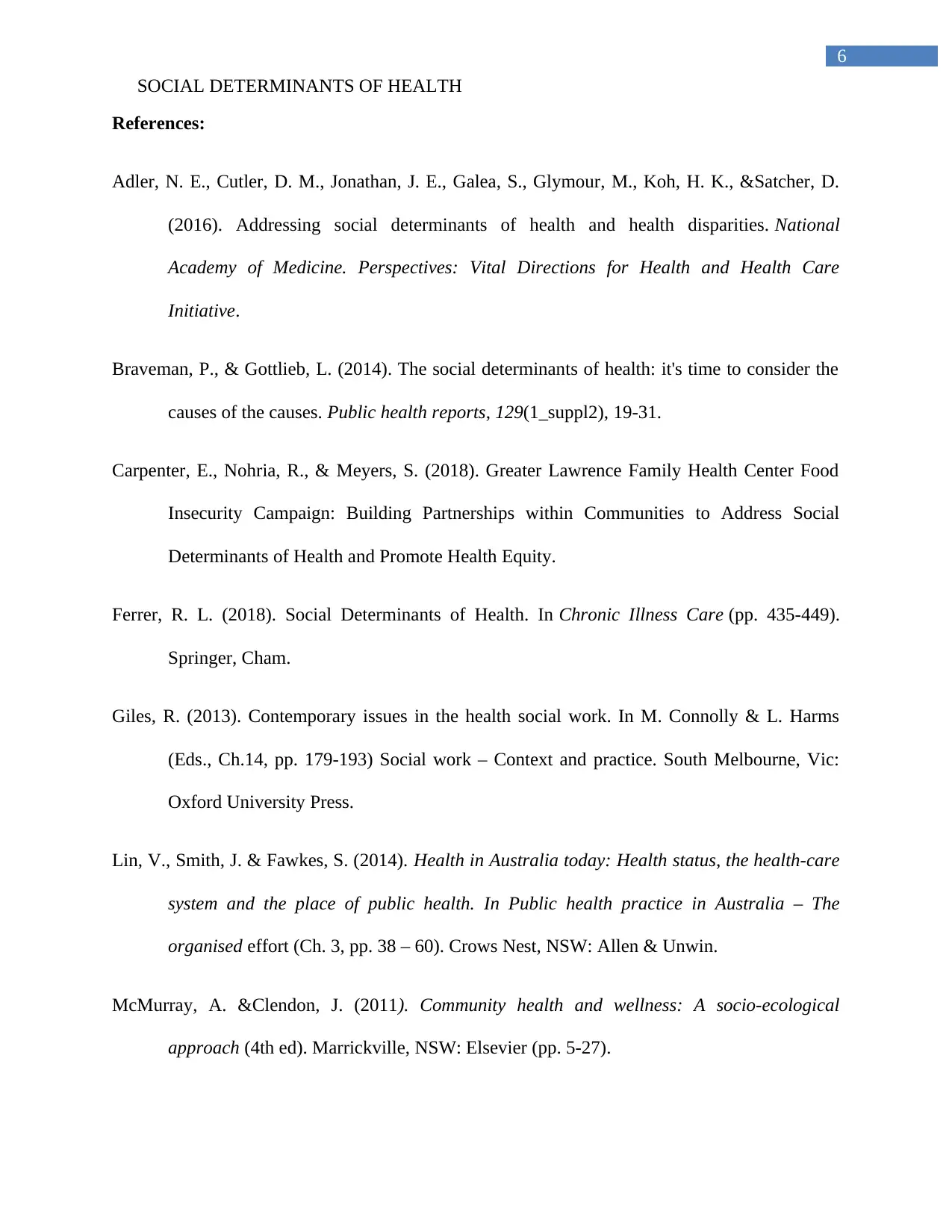
6
SOCIAL DETERMINANTS OF HEALTH
References:
Adler, N. E., Cutler, D. M., Jonathan, J. E., Galea, S., Glymour, M., Koh, H. K., &Satcher, D.
(2016). Addressing social determinants of health and health disparities. National
Academy of Medicine. Perspectives: Vital Directions for Health and Health Care
Initiative.
Braveman, P., & Gottlieb, L. (2014). The social determinants of health: it's time to consider the
causes of the causes. Public health reports, 129(1_suppl2), 19-31.
Carpenter, E., Nohria, R., & Meyers, S. (2018). Greater Lawrence Family Health Center Food
Insecurity Campaign: Building Partnerships within Communities to Address Social
Determinants of Health and Promote Health Equity.
Ferrer, R. L. (2018). Social Determinants of Health. In Chronic Illness Care (pp. 435-449).
Springer, Cham.
Giles, R. (2013). Contemporary issues in the health social work. In M. Connolly & L. Harms
(Eds., Ch.14, pp. 179-193) Social work – Context and practice. South Melbourne, Vic:
Oxford University Press.
Lin, V., Smith, J. & Fawkes, S. (2014). Health in Australia today: Health status, the health-care
system and the place of public health. In Public health practice in Australia – The
organised effort (Ch. 3, pp. 38 – 60). Crows Nest, NSW: Allen & Unwin.
McMurray, A. &Clendon, J. (2011). Community health and wellness: A socio-ecological
approach (4th ed). Marrickville, NSW: Elsevier (pp. 5-27).
SOCIAL DETERMINANTS OF HEALTH
References:
Adler, N. E., Cutler, D. M., Jonathan, J. E., Galea, S., Glymour, M., Koh, H. K., &Satcher, D.
(2016). Addressing social determinants of health and health disparities. National
Academy of Medicine. Perspectives: Vital Directions for Health and Health Care
Initiative.
Braveman, P., & Gottlieb, L. (2014). The social determinants of health: it's time to consider the
causes of the causes. Public health reports, 129(1_suppl2), 19-31.
Carpenter, E., Nohria, R., & Meyers, S. (2018). Greater Lawrence Family Health Center Food
Insecurity Campaign: Building Partnerships within Communities to Address Social
Determinants of Health and Promote Health Equity.
Ferrer, R. L. (2018). Social Determinants of Health. In Chronic Illness Care (pp. 435-449).
Springer, Cham.
Giles, R. (2013). Contemporary issues in the health social work. In M. Connolly & L. Harms
(Eds., Ch.14, pp. 179-193) Social work – Context and practice. South Melbourne, Vic:
Oxford University Press.
Lin, V., Smith, J. & Fawkes, S. (2014). Health in Australia today: Health status, the health-care
system and the place of public health. In Public health practice in Australia – The
organised effort (Ch. 3, pp. 38 – 60). Crows Nest, NSW: Allen & Unwin.
McMurray, A. &Clendon, J. (2011). Community health and wellness: A socio-ecological
approach (4th ed). Marrickville, NSW: Elsevier (pp. 5-27).
Paraphrase This Document
Need a fresh take? Get an instant paraphrase of this document with our AI Paraphraser
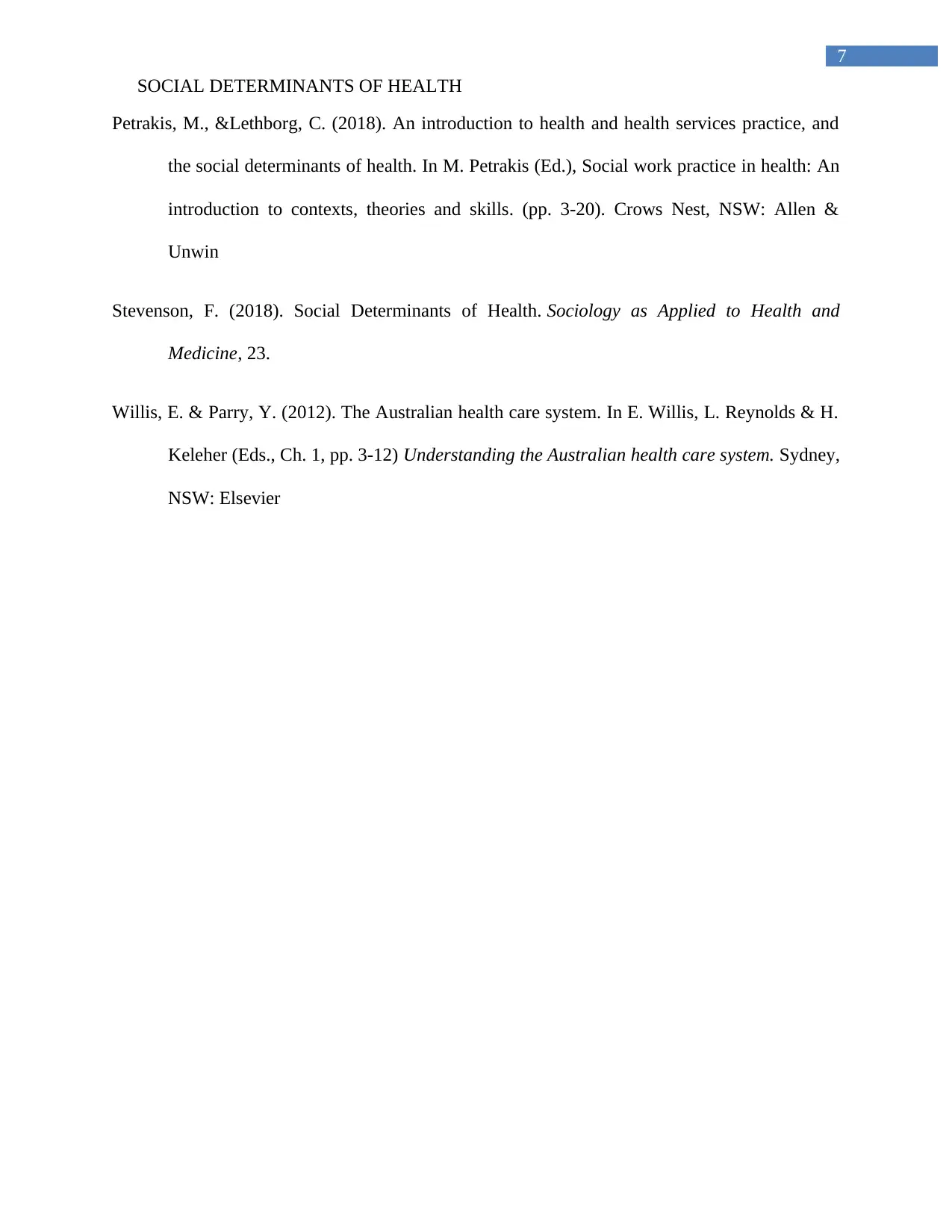
7
SOCIAL DETERMINANTS OF HEALTH
Petrakis, M., &Lethborg, C. (2018). An introduction to health and health services practice, and
the social determinants of health. In M. Petrakis (Ed.), Social work practice in health: An
introduction to contexts, theories and skills. (pp. 3-20). Crows Nest, NSW: Allen &
Unwin
Stevenson, F. (2018). Social Determinants of Health. Sociology as Applied to Health and
Medicine, 23.
Willis, E. & Parry, Y. (2012). The Australian health care system. In E. Willis, L. Reynolds & H.
Keleher (Eds., Ch. 1, pp. 3-12) Understanding the Australian health care system. Sydney,
NSW: Elsevier
SOCIAL DETERMINANTS OF HEALTH
Petrakis, M., &Lethborg, C. (2018). An introduction to health and health services practice, and
the social determinants of health. In M. Petrakis (Ed.), Social work practice in health: An
introduction to contexts, theories and skills. (pp. 3-20). Crows Nest, NSW: Allen &
Unwin
Stevenson, F. (2018). Social Determinants of Health. Sociology as Applied to Health and
Medicine, 23.
Willis, E. & Parry, Y. (2012). The Australian health care system. In E. Willis, L. Reynolds & H.
Keleher (Eds., Ch. 1, pp. 3-12) Understanding the Australian health care system. Sydney,
NSW: Elsevier
1 out of 8
Related Documents
Your All-in-One AI-Powered Toolkit for Academic Success.
+13062052269
info@desklib.com
Available 24*7 on WhatsApp / Email
![[object Object]](/_next/static/media/star-bottom.7253800d.svg)
Unlock your academic potential
Copyright © 2020–2026 A2Z Services. All Rights Reserved. Developed and managed by ZUCOL.





